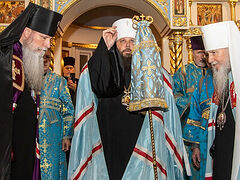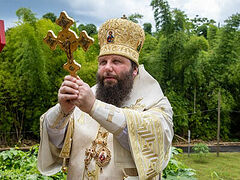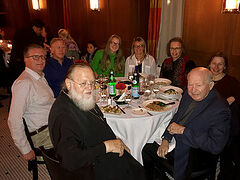On May 16, 2022, His Eminence Metropolitan Hilarion (Kapral), the First Hierarch of the Russian Orthodox Church Outside of Russia, reposed in the Lord at the age of 74.
At its session on September 13, the ROCOR Bishops’ Council elected His Grace Bishop Nicholas (Olhovsky) of Manhattan as the next First Hierarch, and his election was confirmed by the Holy Synod of the Russian Orthodox Church the next day. On Saturday, September 17, he was elevated to the rank of Metropolitan at the ROCOR Synodal Cathedral in New York City, and the next morning he was formally enthroned as the First Hierarch of ROCOR.
A few days later, His Grace Bishop Irenei of London and Western Europe, Synodal Secretary of the Church Abroad for Inter-Orthodox Relations, spoke with OrthoChristian about these important events, about the new Metropolitan, and about his hopes and expectations for the future of ROCOR.
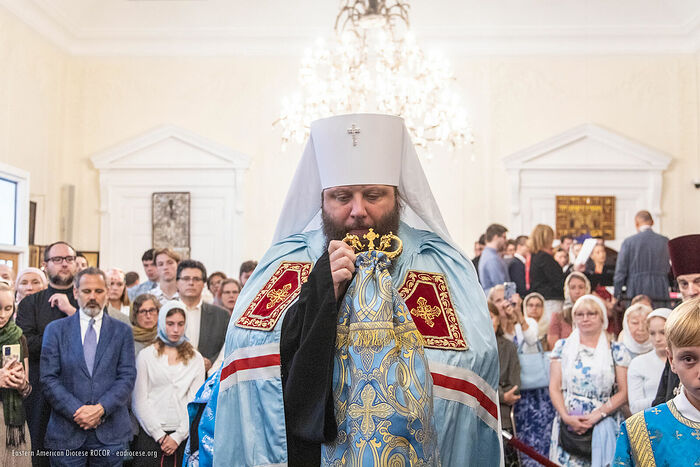 His Eminence Metropolitan Nicholas on the day of his enthronement as the First Hierarch of ROCOR. Photo: synod.com
His Eminence Metropolitan Nicholas on the day of his enthronement as the First Hierarch of ROCOR. Photo: synod.com
—Vladyka, to begin: When you greeted me before this interview, you expressed your happiness at the election of Metropolitan Nicholas as the Russian Orthodox Church Outside of Russia’s new First Hierarch. For those who might not know anything about Metropolitan Nicholas, can you explain this sentiment?
—My comment was above all about the overall spirit in which our Sacred Council of Bishops was unfolding, which of course began with this important process of the election of the primate, and which from the first was marked by a spirit of unity and fraternal cooperation between all the hierarchs of our Church Abroad. Now that the Council has just concluded its work this afternoon, I can say that this spirit reigned throughout the whole week of our meetings, services, and prayers, which cannot but be a source of special happiness to all.
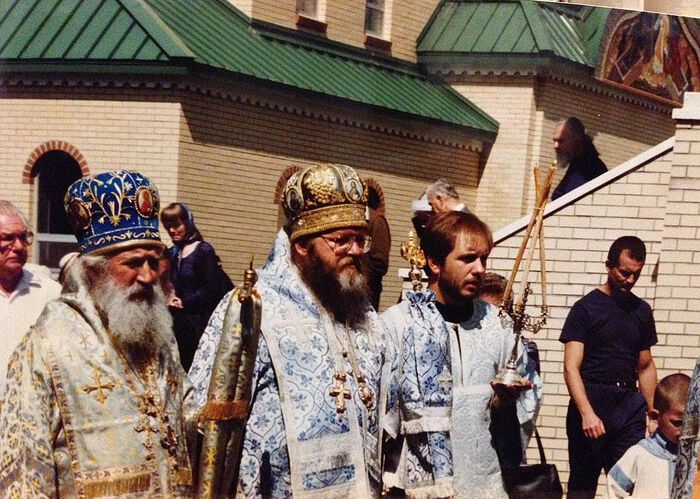 Three future First Hierarchs, L to R: Laurus, Hilarion, and Nicholas. Photo: Facebook
Three future First Hierarchs, L to R: Laurus, Hilarion, and Nicholas. Photo: Facebook
With respect to the new First Hierarch, I can say that His Eminence Metropolitan Nicholas, whom we enthroned at Sunday’s Divine Liturgy in the Synodal Cathedral, is a hierarch marked out by his gentleness and fidelity to the living legacy of our Church Abroad. From his youth he sat at the feet of two of our most notable First Hierarchs: Metropolitan Laurus and Metropolitan Hilarion, serving closely with both and, as it were, received their spirit of absolute trust in God, gentle guidance of the Church’s conciliarity, and deep love for the unique mission of the Church Abroad in the world. He is, to my mind, a very natural choice to succeed our deeply-beloved Metropolitan Hilarion, since we feel in Metropolitan Nicholas so much of the spirit of his predecessor, and indeed of Vladyka Laurus, who was one of the great peacemakers and unifiers of our Church.
—Other bishops received votes as well. Nevertheless, would you say this sense of unity was also felt among the bishops when it was revealed that Metropolitan Nicholas was chosen?
—The election was conducted in a spirit of remarkable peace and calm, not just at its conclusion but from its beginning, and throughout—a gift I credit to the intercession and example of our late First Hierarch. Metropolitan Hilarion was relentlessly peaceful, and always sought a common heart amongst the hierarchy. So his example was with us. We entered into the Synodal Cathedral after an opening prayer before the Kursk Root Icon and an exhortation from the locum tenens, His Eminence Metropolitan Mark of Berlin and Germany, by which the Council was begun, and set about the task of the election.
The practical procedure of the election of a First Hierarch in our Church dates back to at least the early 1960s. It is possibly older than that, but I am not certain. In any case, it dates at the very least from the time of St John the Wonderworker. It is actually a quite simple process, in which each active bishop of the Church casts a single vote for the hierarch he nominates to be primate. This is done prayerfully, by written nomination. In our case at this Council, we had one hierarch who, for reasons of health, was not able to travel to New York; in this case, the protocol permits for his vote to be taken “by telegram," which of course in our present day means by telephone communication. His vote was noted on a paper and likewise placed with the others. Then a “counting committee” of two hierarchs, nominated by the Council, took up these papers one by one in the presence of all, and announced the results. At this Council these hierarchs were His Grace Bishop Luke of Syracuse and myself.
It was clear from the beginning that the Holy Spirit was guiding us to a clear choice. While I do not feel it would be appropriate to speak about individual numbers of votes or names, I believe it entirely appropriate to state that from the reading of the first ballot, His Grace Bishop Nicholas had the overwhelming support of the Council. I believe already from that moment, he had more than three times the number of nominations of any other hierarch. Still, our procedures require that from the initial nominations, three names go forward to a second vote. In this vote, the support for Bishop Nicholas even increased, and from there it was clear that the votes for His Grace satisfied the procedures of election, and Bishop Nicholas was proclaimed the newly-elected First Hierarch of the Church Abroad. We all proclaimed “Axios!” and congratulated our new primate, who humbly offered a few words, and then the first litany for the newly-elected First Hierarch was intoned. After that, we continued with the work of the Council.
—Metropolitan Nicholas is fairly young compared to how old Metropolitan Laurus and Metropolitan Hilarion were when they assumed the First Hierarch’s throne, and he has only served as a bishop for eight years, and only two years as a priest before that. With this context, what personal and spiritual qualities does Metropolitan Nicholas possess that balance his relative youth?
—As I mentioned before, His Eminence has in fact been a dedicated child of the Church Abroad since his youth. While often the First Hierarch is chosen from amongst the more senior hierarchs of the Sobor, this has not always been the case in our history. What is sought, I suppose, is not simply a tally of years since ordination or consecration, but a spirit of conciliarity and fidelity. Such qualities cannot always be weighed against a simple question of “time in office.” Again, let us not forget that the new First Hierarch was closer than almost anyone else to the previous two primates of our Church—the very two you have just mentioned. And, as I have said, he has been charged with accompanying our most sacred relic, the Kursk Root Icon of the Theotokos, on its travels all over the world, and thus in a certain way was already representing our Church and our piety to the world. He was appointed, even as a Vicar Bishop, to be Deputy Secretary to the Holy Synod, and served in that capacity for several years. All these are signs of the confidence that his fellow hierarchs, and really the whole Church, had placed in him already, years before this election.
But beyond all this—how can I put it into words? Vladyka Nicholas loves God, deeply. He loves the Church. He loves his fellow hierarchs and clergy, naturally assuming his role as the servant to all. Our Church Abroad has a unique culture, perhaps. Our First Hierarchs exemplify the axiom of being “first among equals,” not lords of each other, but brothers in common service to God’s flock. It is my belief that, in Metropolitan Nicholas, we will see this spirit continued into the future. And he is not alone: Surrounding him are Metropolitan Mark, one of the longest-serving hierarchs of the Russian Orthodox Church; Archbishop Kyrill, who has been on his cathedra for more than thirty years; Archbishop Gabriel and Archbishop Peter, who are both hierarchs of long experience. The Synod is a fellowship of bishops, serving together, not a pontificate of just one man.
—His Eminence was married for six years until his wife tragically died in September 2010. Thus, he has experience as both a married and a single and monastic cleric. Was this at all a consideration in his election? Do you think this makes him more approachable in the eyes of the faithful?
—I cannot say what precise factors may have been in the minds of the other bishops as they made their decisions. In our Church there is no campaigning for the role of First Hierarch, there are no speeches. And I cannot speak for Vladyka Nicholas himself, but I can say this from my own years of experience of his person: He takes everything that the Lord grants him as part of the path blessed for him in this life. There have been joys and there have been tragedies, but he accepts the will of God, however it may come.
As to your question about approachability, I don’t think people view him as more approachable because of his experiences. No. He is approachable because he is approachable: It is simply an aspect of his character. You feel it immediately. In this, he is very much like Metropolitan Hilarion.
—In your letter to your flock about the election, you write that in Metropolitan Nicholas, many “find incarnated the spirit and way of life of Metropolitan Lavra.” Could you say more about this? What qualities of Metropolitan Laurus do you see reflected in Metropolitan Nicholas?
—Beyond those I have already mentioned above, I could add just one more, and perhaps one that reveals my propensity for ecclesial terminology: namely, a spirit of true synodality. Metropolitan Laurus led the Church Abroad through some of her most difficult moments, when generations of division were at the threshold of being overcome and unity within the Russian Orthodox Church restored. Of course, this came with huge temptations. There were those who felt one way, those who felt another, and sometimes these disagreements were extremely heated. But Metropolitan Laurus’ example was always one of synodality: not to “rule from on high,” or to make decisions on behalf of the other bishops, but to prayerfully guide them through such difficulties, towards a common mind and voice. This I see very much, also, in Metropolitan Nicholas.
—In your letter to your flock, you also write that Metropolitan Nicholas has close associations with parishes in Europe. Tell us more about this, please.
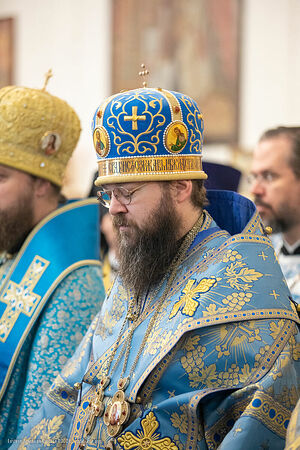 His Grace Bishop Irenei of London and Western Europe on the day of Met. Nicholas' enthronement. Photo: synod.com —In the year immediately prior to my appointment as Ruling Bishop of Great Britain and Western Europe (namely, in 2017-2018), when these were yet two different dioceses and I was administrator of the former (laboring together with our late Metropolitan), then-Bishop Nicholas was appointed as administrator of the Western European Diocese. For a few months he was therefore directly responsible for our parishes in Switzerland, France, Belgium, etc. In that capacity, he came to Europe and he and I together led a clergy retreat in the Swiss Alps, and Bishop Nicholas got to know many of the clergy and parishes in Europe. Even in so short a time (I was appointed to the region less than a year later), he made a very strong impression on our clergy. He was able to solve certain problems that existed in this place or that, and developed, I think, a genuine fondness both for the place and its peoples. Of course, they are now looking forward to welcoming him, at a time when God shall bless, on his first visit to Great Britain and Europe as primate.
His Grace Bishop Irenei of London and Western Europe on the day of Met. Nicholas' enthronement. Photo: synod.com —In the year immediately prior to my appointment as Ruling Bishop of Great Britain and Western Europe (namely, in 2017-2018), when these were yet two different dioceses and I was administrator of the former (laboring together with our late Metropolitan), then-Bishop Nicholas was appointed as administrator of the Western European Diocese. For a few months he was therefore directly responsible for our parishes in Switzerland, France, Belgium, etc. In that capacity, he came to Europe and he and I together led a clergy retreat in the Swiss Alps, and Bishop Nicholas got to know many of the clergy and parishes in Europe. Even in so short a time (I was appointed to the region less than a year later), he made a very strong impression on our clergy. He was able to solve certain problems that existed in this place or that, and developed, I think, a genuine fondness both for the place and its peoples. Of course, they are now looking forward to welcoming him, at a time when God shall bless, on his first visit to Great Britain and Europe as primate.
—What are the main challenges facing ROCOR and Metropolitan Nicholas as its First Hierarch today?
—What are the challenges of God’s children in any age? Faith and repentance. We like to assume that things are harder in our day than they ever have been before, or “the world has changed” and things are worse, but these selfish pretensions never really hold up to reality. Ever since Christ walked in Galilee, people have struggled to deepen their faith and attain saving repentance. Today, it is no different. Modern man is lost, just like ancient man was lost. He needs what Christ offers. He needs what the Church offers. The Church must stand at the ready to give it.
Of course, we live in times that are marked out by our specific troubles, and chief amongst these, we might say, is the devil’s use of fear and anger to divide people. I sorrow deeply at the bloody war unfolding in Ukraine, where Orthodox brother fights Orthodox brother. I sorrow that it creates divisions, not just there, but throughout the world. And we see a general laxity of faith and piety in far too many places.
But we are Christians: We shall not despair. Where there is war, we must work to make peace. Where there is hatred, we must preach God’s love. Where there is division, we must work towards unity, and by this I do not mean unity as simply “togetherness,” but unity in the truth. God’s Law is the only law the softens man’s heart. In our faithfulness to it, we can never bend. I am certain that our Church Abroad will continue to foster these things.
—Of course, there are many jurisdictions in the diaspora, each with their own “feel.” What particular aspects and strengths of ROCOR do you hope to see continued and developed under Metropolitan Nicholas?
—That is an enormous question! Perhaps I can answer it like this, echoing a little the language of Metropolitan Nicholas at his enthronement: I do not only hope, but I expect, that our Church Abroad will continue in the entirety of her unique life into this second century of her mission. The unique “feel,” as you say, of ROCOR, isn’t just one thing here or one thing there; it is the conflux of our whole way of life, our ascetical practices, our canonical rigor, our liturgical heritage, our musical culture, the relationship of our hierarchy and clergy to the faithful, our autonomy of Synodal governance, our strong position on moral and ethical matters, our propensity to embrace tradition whole-heartedly — all these things are parts of the story. All of them will continue. And perhaps that is part of the “feel” of ROCOR also: that we have no desire and no intention to “change with the times.” We preach what our fathers taught, as they taught it. In this modern world, that is far too rare a thing.
—His Eminence Archbishop Viktor of Artzysk, Vicar of the Odessa Diocese of the Ukrainian Orthodox Church, participated in the enthronement of Metropolitan Nicholas. Did he know Met. Nicholas personally? Or was he simply sent as a representative of the Ukrainian Church?
—I know that they had met before, when Vladyka Nicholas had visited Odessa, but apart from this I do not myself know of a broader connection between them. I believe it was above all the case that the Ukrainian Orthodox Church, with whom our Church Abroad has the closest fraternal relations and for which we not only offer up prayers at every Liturgy but also help in as many practical ways as possible, wished to have a brother hierarch present for the joyful occasion of a primatial enthronement. We were very pleased to pray with him, and to partake of the Divine Mysteries together.
We also had representatives with us from the Serbian Orthodox Church, Moscow Patriarchate, Antiochian Orthodox Church, Orthodox Church in America, and others. Such occasions are important moments of unity between the Local Churches.
—To touch on a more controversial topic, Abp. Elpidophoros of the Greek Orthodox Archdiocese sent congratulations to Metropolitan Nicholas, saying: “Despite the challenges of recent years, the Greek Orthodox Archdiocese of America and the Russian Orthodox Church Outside of Russia have had a very positive and edifying relationship.” In fact, Archbishop Elpidophoros would have liked to consecrate a former cleric, defrocked by ROCOR, as a bishop within the “Slavic Vicariate” he has set up in the USA, but which has been indefinitely delayed, at least in part because of protests from almost all other Orthodox jurisdictions in America. What has been Metropolitan Nicholas’ response to this tragic situation thus far, and are there any prospects (or desire) for developing a better relationship with GOARCH?
—Firstly, let me say that the specific situation regarding the so-called “Slavic Vicariate” and the intention to uncanonically ordain a defrocked former priest is, rather than a topic of controversy, more than anything else a cause for deep sorrow amongst us all. There is simply nothing holy about this, nothing pastoral, nothing even remotely Orthodox. And I regret that, yes, the actions of the current Archbishop of the Greek Orthodox Archdiocese of America, have in certain ways brought division rather than unity. But in this, as in all other matters, we simply stand steadfast on the holy canons, whatever strange circumstances may be devised by others. The machinations of men come and go, but those who adhere to God’s Law will always have Him as their defender.
In terms of the relationship between our Church Abroad and the Greek Archdiocese in the USA, I would say that of course there is the deeply felt hope that this fractured relationship may be restored. I cannot imagine any member of our Sobor would think otherwise, including our new First Hierarch. But unity, as I said in a different context a few moments ago, is not a question of friendly feelings or pleasant words. Unity must be unity in truth. The standard for Church unity is the common adherence to the fullness of the Gospel, and to the canonical order set forth by the saints. Where this is maintained, our unity is the natural result; where it is abandoned, that unity cannot exist. And so our call is for all of us to adhere the more strongly, faithfully, and unbendingly to the truth of the Church, to her canons, her Scriptures, her Mysteries, and her life. These must be first in our mind, and then unity will be the joyful result.
—Is this goal truly possible?
—With God, all things are possible! And perhaps this is precisely what I found so encouraging throughout the whole of our recently-concluded Council: Not only did we elect a new First Hierarch, but we set about the practical and spiritual matters facing our Church and our faithful in these days. God gives us a path towards redemption, we only have to follow it! And when I see the eagerness to follow that path, so vividly expressed, it stirs my own heart with new zeal.
Our Church Abroad is now in her second century. She is proof that even the deepest divisions can be overcome, the fiercest wrongs made good, and the lost sheep found and protected. I pray that God will give wisdom to our new First Hierarch, to our Holy Synod and whole Council of Bishops, and to all our pious clergy and faithful, that we may continue on this path for centuries to come.
—Vladyka, thank you very much for taking the time to speak with us.
—You’re very welcome, and may God bless all readers of OrthoChristian.com.

